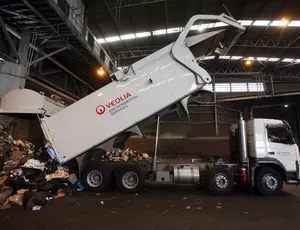Important notice
The Spring Farm Resource Recovery Park has reopened to the public and is again accepting materials as usual.
Veolia Spring Farm Resource Recovery Park
The Spring Farm Resource Recovery Park (RRP), located in Sydney's south-western suburbs, services nearly half a million residents in four nearby councils.
Formally known as the Macarthur Resource Recovery Park and the Jacks Gully Waste and Recycling Centre, the Spring Farm RRP consists of several zones across the 38-hectare site dedicated to sorting, processing, and transferring general, liquid, and mixed solid waste, organic material, glass, and other recyclable materials.
The site generates renewable energy sourced from onsite solar panels and methane extracted from waste during processing.
Contact Spring Farm RRP
Address: 20 Barrow Rd, Spring Farm 2570 NSW
Phone: 1300 651 116
Opening hours:
Monday - Friday: 6:00am - 4:00pm
Saturday: 8:00am - 4:00pm
Sunday: 8:00am - 12:00pm
Keep up to date with our holiday operating hours here.
For information regarding opening hours, fees, acceptance criteria or other site-specific information, please submit our online enquiry form or call Customer Service on 13 13 35.
What is on site at Spring Farm
- Material recycling facility (MRF)
- Public drop-off area
- Transfer areas for organic and general waste
- Richardson Road engineered landfill (closed)
- Power station
- Liquid treatment plant
- Product destruction facility
- Glass processing
Spring Farm Material Recycling Facility (MRF)
The Spring Farm MRF sorts recyclable materials collected from homes into different categories, or "streams", including paper, cardboard, plastic, glass, and metals. Each stream is then sold in both local and overseas markets for further processing and use in manufacturing to create new products.
The facility currently services over 104,000 households in four neighbouring council areas.
Site is not open to the public.
Public drop-off area
The site's public drop-off area is open to households and small businesses to dispose of small quantities of:
- Paper and cardboard
- Metal
- Vehicle batteries
- E-waste
- Sump oil
For a detailed guide to accepted waste and applicable fees at Veolia's facilities in NSW, please download our NSW Waste Charges and Services booklet.
Glass processing
Glass that has been sorted at the MRF is transported to a specialised onsite glass processing facility. Here, the glass undergoes a thorough cleaning process to remove any residues and contaminants such as plastic, metal, and other debris. Once cleaned, the glass is crushed into a fine, granular material known as "cullet".
This cullet has a variety of uses and serves as a valuable resource in numerous applications. One significant application is in road construction, where cullet is utilised as a component in asphalt or as a base material for road surfaces. The use of cullet in road construction offers several benefits, including improved durability, enhanced skid resistance, and reduced environmental impact.
Richardson Road engineered landfill (closed) and power station
Richardson Road and Jack's Gully landfills have ceased operations and are now capped to keep them enclosed. The sites have been fitted with gas capture technology and repurposed for methane gas collection. The extracted methane is transported via a pipeline to the dedicated power station, where it is converted into electricity and integrated into the state's energy grid. This technology enables the retired landfill areas to be utilised for renewable energy generation, contributing to the local circular economy.
Liquid treatment plant
Liquids recovered from Spring Farm RRP's operations, including fluids from product destruction and leachate extracted from the Richardson Road and Jack's Gully landfills, are treated and managed onsite to ensure they are suitable for safe disposal.
The liquid treatment plant removes or reduces contamination to levels which are safe for the liquid's controlled discharge into the municipal sewerage system, where it undergoes further treatment and stabilisation at a wastewater treatment facility.
Garden organic composting
Garden organics (GO), which includes grass clippings, leaves, flowers, and small branches from the household green-lidded bin, are received on site in a designated section of the Spring Farm RRP. These organic materials are bulked up and shipped off site to a designated composting facility, where they are then composted using a controlled process that transforms them into a nutrient-rich, high-quality garden product. This compost can be used to improve soil health, promote plant growth, and reduce the need for chemical fertilisers.
It is crucial that only garden organics are placed in the GO bin. Contamination from other materials poses a significant challenge to the composting process. Items such as plastics (including those labelled as biodegradable or compostable), food waste, and wooden products (such as furniture items) can disrupt the composting process, reduce the quality of the final product, and potentially damage composting equipment.
By ensuring that only appropriate materials are placed in the GO bin, residents can play a vital role in supporting the composting process and contributing to the creation of a valuable resource for gardening and landscaping.
Product destruction facility
The Spring Farm RRP's product destruction facility offers comprehensive and specialised services for the secure disposal of sensitive products. These services prioritise cost-effectiveness, security, and sustainability to ensure that clients can meet their disposal needs without compromising their financial or environmental responsibilities. By utilising a secure product destruction facility, businesses can maintain compliance with industry regulations and protect their reputation by preventing unauthorised access to confidential information or proprietary materials.
Environment and Safety
At Veolia we take our responsibility to the safety of people and the environment seriously.
All visitors to Veolia facilities must observe site safety requirements, including wearing enclosed footwear at all times.
- Read also -
30 October, 2025
Impacted waste has been removed from the site.
Site clean up is progressing well.
Building repairs are underway.
Daily report provided to the NSW EPA.
Independent consultant engaged to undertake environmental assessment.
Detailed report required under MP05_0098 Condition 5.1 submitted to DPHI yesterday at 2:04pm.
31 October, 2025
All fire water removed from transfer station.
Independent engineer engaged to undertake building assessment.
Building scan completed.
Daily report provided to the NSW EPA.
Site continues to operate under reduced capacity.
Site will be closed across the weekend with no loads in or out.
Independent environmental consultant engaged.
1 November - 2 November, 2025
No remediation activity as site closed for the weekend.
3 November, 2025
Building assessment still underway - reports being generated.
The site continues to operate under reduced capacity, with only limited waste entering the site.
4 November, 2025
The structural engineer has given further direction.
Sub contractors engaged and commencing tomorrow.
The site continues to operate under reduced capacity, only limited waste entering the site.
5 November, 2025
Site remediation is continuing to facilitate return to normal operations as soon as reasonably practicable.
The site continues to operate under reduced capacity. Waste diversions in place.
Daily reports continue to be provided to the NSW EPA.
DPHI has commenced its detailed assessment of the incident report.
6 November, 2025
DPHI has advised no comment on the Detailed Report of the incident document at this time as required under condition of the development consent.
The site will operate at increased capacity tomorrow due to some restrictions being lifted today.
Daily reports continue to be provided to the NSW EPA.
7 November - 9 November, 2025
Update for activity undertaken on Friday 7 to Sunday 9 November, 2025.
Waste clean up of incident completed.
External Consultation ERM onsite undertaking sampling.
Building rectification works underway.
Closed this weekend, 8 and 9 November, for all receival.
Reopening to the general public on Monday 10th November following closure for safety reasons.
10 November, 2025
The public drop off reopened to the general public yesterday.
While the building is undergoing structural and cosmetic works, we anticipate these works will be completed with no disruption to normal residential waste collection services.
Veolia would like to thank first responders, emergency services, the community, and general public for their patience, cooperation, and understanding while we worked through this event.
You can assist us with preventing events like this in the future by ensuring hazardous waste is not placed in your curbside waste bins. This includes batteries, chemicals, paints, oils, gas bottles, and solvents.




